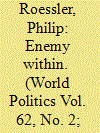| Srl | Item |
| 1 |
ID:
180014


|
|
|
|
|
| Summary/Abstract |
This article analyzes the states of Iran and Egypt before the eruption of revolutionary processes in those countries in 1979 and 2011 respectively. Its aim is to delineate the different roles of the armies as the last lethal and organized bastions of dictatorships during those revolutions. In Egypt, the army successfully protected the Egyptian state from a complete downfall, while in Iran, the army became completely disorganized and shattered. It argues that the extreme personal rule of Iran’s shah [king] within a neo-sultanic framework and his extreme depoliticization of the army rendered it unable to act independently during a revolutionary process. In contrast, the distribution of power between the army and presidential palace within an institutionalized dual military state enabled the army to play a much more definitive role during the revolutionary process in Egypt. Consequently, unlike in 1979 Iran, the army in 2011 Egypt not only saved the pre-revolutionary military dictatorship but restored it in a much more brutal way.
|
|
|
|
|
|
|
|
|
|
|
|
|
|
|
|
| 2 |
ID:
103866


|
|
|
|
|
| Publication |
2011.
|
| Summary/Abstract |
Why do rulers employ ethnic exclusion at the risk of civil war? Focusing on the region of sub-Saharan Africa, the author attributes this costly strategy to the commitment problem that arises in personalist regimes between elites who hold joint control of the state's coercive apparatus. As no faction can be sure that others will not exploit their violent capabilities to usurp power, elites maneuver to protect their privileged position and safeguard against others' first-strike capabilities. Reciprocal maneuvering, however, reinforces suspicion and increases intrigue within the regime, undermining trust and often triggering a security dilemma. In the face of a rising internal threat, rulers move to eliminate their rivals to guarantee their personal and political survival. But the cost of such a strategy, especially when carried out along ethnic lines, is that it increases the risk of a future civil war. To test this argument, the author employs the Ethnic Power Relations data set combined with original data on the ethnicity of conspirators of coups and rebellions in Africa. He finds that in Africa ethnic exclusion substitutes civil war risk for coup risk. And rulers are significantly more likely to exclude their coconspirators-the very friends and allies who helped them come to power-than other included groups, but at the cost of increasing the risk of a future civil war with their former allies. In the first three years after being purged from the central government, coconspirators and their coethnics are sixteen times more likely to rebel than when they were represented at the apex of the regime.
|
|
|
|
|
|
|
|
|
|
|
|
|
|
|
|